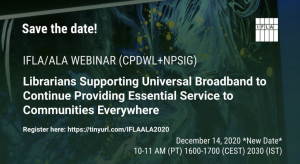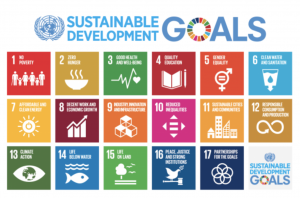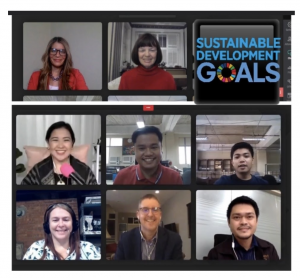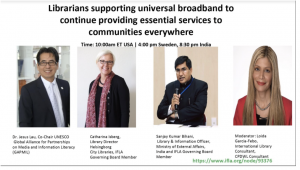By Loida Garcia-Febo, CPDWL Consultant, International Library Consultant
Libraries as we knew them were forever changed by COVID-19. The pandemic brought up an opportunity to re-envision libraries to provide services in a way that reflects specific needs from communities deeply affected by it. This global situation also taught us to prioritize and shone a light on inequalities. How to start addressing all of these to create the libraries we deserve?
Recently, I coordinated and moderated an online event part of IFLA CPDWL and New Professionals webinar series with ALA entitled “Librarians supporting universal broadband to continue providing essential services to communities everywhere.” This event also highlighted advocacy efforts of IFLA which are guiding and supporting the path of libraries as we move towards the future, post-COVID-19, its aftershocks, and beyond.
This webinar spoke to the value of libraries and to the fact that as librarians we strive to work towards providing access to information to all. IFLA has championed the UN’s Sustainable Development Goals for a long time. As we know, library services include providing access to the Internet through computers and wifi to library users that would have access to information that might help them to prevent health conditions such as COVID-19, better their education and overall prospects in life.
These are areas that are intrinsically related to the achievement of development as it is contemplated in the United Nations Sustainable Development Goals. Advocacy towards universal broadband can change our world! Librarians working together in concerted action with different stakeholders can secure actions from governments to ensure that all citizens have access to the internet.
All of this is supported by the 59th session of the United Nations’ Commission on Social Development currently in session in New York and online and until 17 February and its priority theme: socially just transition towards sustainable development: the role of digital technologies on social development and well-being of all.
Remarkably, and as per IFLA’s recent communication, the United Nations has underlined the role of libraries in extending connectivity and building skills, ahead of discussions (taking place during this 59th session) about how digital technologies can advance social development.
IFLA continues to lead the way in these advocacy efforts with submissions to the Commission stressing that it remains a priority to overcome the digital divide and allow more people to benefit from the possibilities that digital technologies can bring.
Another successful advocacy initiative from IFLA is the launching of a Library Pledge to Promote Digital Inclusion and access to information during COVID-19 and beyond. This is an advocacy tool to collect signatures and “demonstrate to decision-makers the commitment of libraries to do all in their power to ensure that everyone, especially during COVID-19, has the possibility and skills to access and use information effectively.”
Global organizations such as UNESCO have indicated that broadband is “the missing link” in global access to education. But as we know, COVID-19 propelled a massive shift to digital which made evident the reality of inequality of access to the Internet which also plays into the mission and operation of libraries.
IFLA’s pledge speaks to pronouncements from UNESCO and also from the Internet Governance Forum (IGF) which recently called attention to the Internet as a vehicle for human resilience and solidarity. The IGF have stated that inclusion achieved by access to the Internet is a key contributor towards a stronger economy and enhanced economic development through shared wealth, shared employment, and equal opportunity for all. Additionally, the IGF has said that the Internet is an enabler towards the fulfillment of the UN’s 2030 Agenda for Sustainable Development. A Library Pledge to promote digital inclusion and access to information during COVID-19 and beyond is an advocacy effort highly visible in the global arena.
Empowered by these actions from IFLA, library associations are developing advocacy efforts to support broadband and digital inclusion at national and local levels. Therefore, IFLA is positively impacting advocacy efforts towards universal broadband and digital literacy in nations worldwide. For instance, advocacy efforts by the American Library Association (ALA), state that broadband in libraries is needed by patrons to access devices, collections and information, and a myriad of services. It is also used by librarians to create and develop content accessed by patrons and provide access to transformative resources to better the education and lifelong learning of communities deeply impacted by COVID-19 in all regions of the world.
Furthermore, during ALA’s Midwinter Meeting this past January 2021, the ALA Council passed a Resolution in Support of Broadband as a human right which resolved that ALA, on behalf of its members:
- affirms universal access to affordable high-capacity broadband is as essential as electricity and therefore a basic right for all; and,
- advocates for legislative and regulatory policies through which libraries can affect positive change toward such universal access.
This resolution would be used by library advocates to support efforts towards universal broadband in their local areas. These actions can take various shapes at national and local levels. For instance, the ALA is a sponsor of an upcoming webinar by the Schools, Health, and Libraries Broadband Coalition (SHLB) entitled “Biden and Broadband” featuring former advisors to US President Biden which explores what comes next in the areas of prospects of legislation, the U.S. Federal Communication Commission, and other aspects within and during the US President Biden administration.
Additionally, I am happy to share that the ALA’s UN 2030 Sustainable Development Goals Task Force which I Chair is coordinating a webinar to support universal broadband as essential for development.
I would like to encourage everyone to pay close attention to all these advocacy developments to support libraries. Continuing to work together in concerted action with cohesive leadership will ensure that we reach stakeholders and partner with key agencies and organizations to bring the change we need to help communities deeply impacted by COVID-19, the aftershocks and beyond. With IFLA leading, Together, we can!
——
Webinar information:
“Librarians supporting universal broadband to continue providing essential services to communities everywhere”
I was honored to moderate the webinar featuring library leaders from IFLA, UNESCO Media and Information Literacy (MIL), and libraries in different regions sharing considerations on how to move forward towards this urgent goal. Speakers included:
- Dr. Jesus Lau, Co-Chair UNESCO Global Alliance for Partnerships on Media and Information Literacy (GAPMIL)
- Catharina Isberg, Library Director Helsingborg City Libraries, IFLA Governing Board Member;
- Sanjay Kumar Bihani, IFLA Governing Board Member, Library and Information Officer at the Ministry of External Affairs, Patiala House Annexe, Tilak Marg, New Delhi, India.
CPDWL has presented webinars for the global library community since 2012 when I, together with CPDWL and IFLA New Professionals, established the “New Professionals Global Connection: Best practices, models and recommendations” webinar series. Over the years we have collaborated with other IFLA Sections such as the Latin America & Caribbean Section to present webinars in Portuguese and Spanish besides English. See available recordings on the CPDWL YouTube Channel: https://www.youtube.com/channel/UCj-wuXjzoITokcO5qr0R4xA/videos and on the IFLA New Professionals website: https://npsig.wordpress.com/webinars-2/



